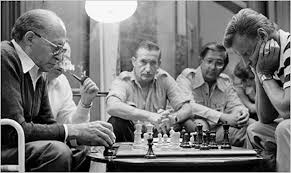Menachem Begin knew quiet, at long last, but not peace.
When the Israeli Prime Minister’s wife died suddenly in the midst of political tumult with Lebanon, Begin resigned from office, suffering from depression, and spent the last nine years of his life in seclusion. As a soldier and politician, he’d had much of his life occupied by the fury of war, famously enjoying a great moment of peace with Egypt. Once resigned, he was only seen again in public when he would occasionally say Kaddish at his wife’s gravesite.
The opening of Peter Carlson’s 1983 People profile, written at the beginning of Begin’s retreat:
In the frigid predawn darkness, dozens of photographers perched on rooftops overlooking Jerusalem’s cemetery on the Mount of Olives. With their cameras pointed toward the grave of Aliza Begin, they shivered, waiting for a rare chance to catch former Prime Minister Menachem Begin in their viewfinders. Begin had not appeared in public since his sudden resignation last Aug. 28. Rumors had spread that he would skip the traditional Jewish ceremony on the first anniversary of his beloved wife’s death and instead visit the cemetery under cover of darkness to pray privately. The photographers blew on their frozen fingers, stamped their icy feet and scanned the cemetery, but the old warrior did not appear. Nor did he join his son, Beni, 40, and his daughters, Chassia, 37, and Leah, 34, at the memorial services at noon the following day. Instead, he sat with a flannel bathrobe draped over his pale, emaciated frame and watched the tribute to his wife of 43 years on an old television set.
Begin’s behavior did not surprise his closest associates. “His heart is broken,” says Yona Klimovitsky, 36, who has served as the Israeli leader’s secretary for more than a decade and was as close as a daughter to both Begin and his wife. “He misses Aliza more than one can imagine. He is thoroughly alone now.”
Only a year ago, Menachem Begin was among the world’s most powerful men. Today, at 70, he is a recluse. He has not only resigned from office, he has retreated from life. Since his resignation, he has not ventured outside the official Prime Minister’s residence, which he has still not vacated. His children are furnishing a new apartment for him, but the place is not yet ready. (His successor as Prime Minister, Yitzhak Shamir, continues to live in a three-room walk-up apartment.) Unable to shave due to a skin disorder that covers his face with brown blotches, Begin has grown a long, totally white beard. Exhibiting the classic symptoms of clinical depression, he eats little—vegetables, rice, cottage cheese and eggs prepared by his daughter Leah—and sits day and night in robe and slippers, watching television and rereading books. He sees no one but his children and calls no one on the telephone. When old friends and political allies phone, he parries their inquiries with polite but curt replies. “I telephone him on various developments,” says Prime Minister Shamir. “He sounds as if he is interested in things, but I haven’t seen him in quite a few weeks.”
Begin’s nearly catatonic retirement comes after a lifetime of almost constant action. Born in an area of Poland that is now part of Russia, he lost both parents in the Nazi Holocaust and was himself imprisoned in a Soviet labor camp in Siberia. After emigrating to Palestine in 1942, he led the Irgun, the infamous anti-British terrorist group that bombed Jerusalem’s King David Hotel in 1946, killing 76 people. For nearly 30 years after Israel achieved independence in 1948, Begin led the right-wing opposition forces in the Knesset while raising his three children in an austere, two-room Tel Aviv apartment. Then, in an upset victory that shocked Israel, he was elected Prime Minister in 1977. The high point of his six-year term was the Nobel prizewinning 1978 peace treaty negotiated by President Jimmy Carter and signed by Begin with Egyptian President Anwar Sadat. The low point was last year’s bitter invasion of Lebanon and the subsequent shocking massacres at the Sabra and Shatila refugee camps in Beirut.
It was the war in Lebanon that triggered Begin’s emotional decline, says Klimovitsky. “He thought the army would go in, make a quick blitzkrieg and victoriously get out,” she says. “Instead, it went on and on, and more and more casualties fell. He feels betrayed by those who led him up the garden path about Lebanon. What disturbs him are the casualties—ours and the Lebanese. That was what made him turn more and more into himself.”
Shortly after the Palestinian refugee-camp massacres left Begin reeling, the death of his wife in November 1982 from chronic asthma and a heart attack devastated him.•
Tags: Menachem Begin, Peter Carlson

